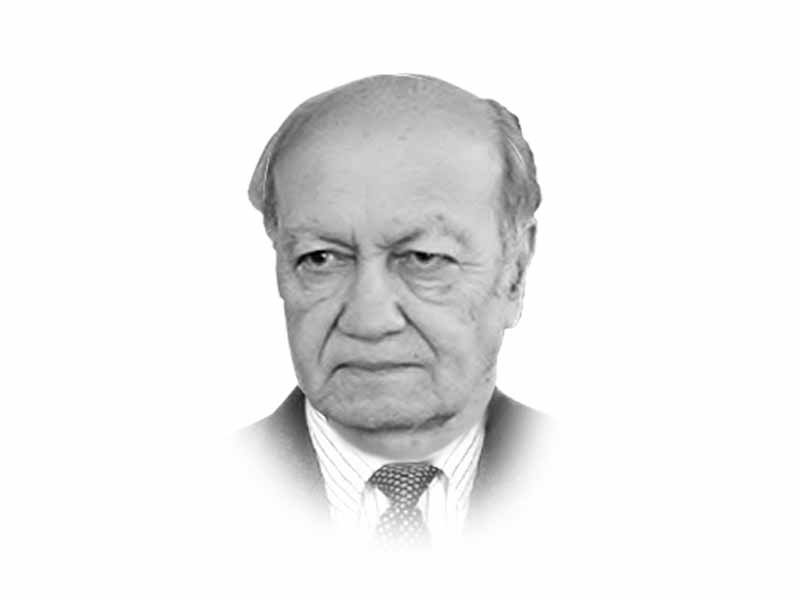
When the country’s leaders are not very careful in their utterances they could inadvertently expose the bankruptcy of their ideas and concepts of governance. And may even give an impression of being bereft of principles. One glaring example of these phenomena was evident when the Prime Minister described the role of the ISI acting as a check against political office holders and politicians.
The military and intelligence agencies have an extremely important and critical role in the defence of the country. For Pakistan these institutions acquire even greater significance in view of the country’s geostrategic importance and a hostile neighbourhood. They have been guarding the country’s ideological and physical frontiers, a task they have been performing admirably well under difficult conditions. But to involve them as a check on the quality of governance or on the politicians would neither serve their or the country’s interest. More importantly, it would be in contravention with the Constitution of the country and against basic democratic norms.
For the PM, his foremost priority should be to create a political environment that is conducive in addressing Pakistan’s present multiple challenges. This would require the PM and the PTI leadership to seriously review their present confrontational policy of not engaging with the opposition. This is a prescription to lead the country into a long drawn internal conflict with wide ranging ramifications. It would weaken parliament and democratic practices and certainly give a boost to the joint opposition to destabilise the government. For it would embolden its leadership and provide justification of its nationwide protests.
What the PTI leadership fails to comprehend is that it is not just the fiery speeches of Nawaz Sharif, but it is the lack of delivery and a highly uncertain future that are the motivational forces behind the rising tide of people’s frustrations. Galloping inflation, persistent shortages of basic food items and poor governance all add up to a combustible mix that the opposition plans to exploit.
With hardly any interaction between the government and opposition on major national issues or policy matters, democracy continues to suffer. Refusing to engage with the opposition, the government has preferred to promulgate ordinances rather than enacting laws through parliament. These may be short- term tactics of overcoming legal bottlenecks but eventually the PTI leadership will have to work out a functional relationship with the opposition.
Moreover, PM Imran Khan’s single-minded approach in pursuit of corruption cases against the top opposition leaders and his strong disdain of parliamentary practices has led to his leaning heavily on the army and bureaucracy for support. The PM and the ministers have frequently expressed the cordial relations with the army leadership as a singular achievement. Considering Pakistan’s past there is no doubt that there have been few periods when the two sides have worked in harmony.
The PTI leadership realising that it is legally inappropriate to keep harping the earlier version that the government and security institutions are on the same page is now more discreet. Generally, in democratic countries good relations between institutions is the norm rather than an exception and it would be odd to make such remarks.
There are likewise serious shortcomings within the opposition political parties that cannot be overlooked. Even after seven decades of Pakistan’s existence there is over emphasis and heavy reliance on personality-oriented and cult-based politics. This has to give place to policy and performance focused politics. The problem is the overarching dominance of families in political parties that inhibit talent to be thrown up. There are adverse consequences when political parties promote a culture of favouritism. This vicious cycle would be broken only if there were genuine party elections on a regular basis within political parties. The present leadership seems to be averse to any change in this direction.
The use of the Tiger Force for keeping a check on market prices may be a novel approach from the PM’s point of view but has serious downside. Foremost, its ability to control prices is questionable. Their deployment betrays that there is a lack of understanding of how a free economy operates. The government cannot dictate or fix prices of food items and commodities, as is the practice among certain communist states.
Countries such as the United States and India that at one time were considered to be fairly successful functioning democracies are now in political turmoil and their leaders flouting basic democratic norms. Free press, independent courts, fair legal system and a multi-party political system that India once boasted have been completely reversed. Many countries of Europe — Hungary, Poland, etc — have authoritarian regimes and democracy is only in name.
Since President Trump’s assumption of office the democratic decline in the US has been most pronounced. This had serious ramifications globally with authoritarian regimes and monarchies gaining wider acceptability and human rights violations being generally ignored.
Then there are perennial problems that every successive Pakistani government had to face including the present one that sap resources and throttle economic and political development. Lack of finding an amicable resolution of Kashmir and the struggle to keep pace in the nuclear field with India are huge challenges that come at a cost. Undeniably, it is also a fact that Pakistan inherently has the capacity and capability to advance much further and faster if there was a peaceful regional environment.
But this is nowhere visible even on the horizon whether it is the eastern or western front. So Pakistan has to steer and modify its policies that do not hamper economic growth and political stability. Without sustained economic growth, all other policy targets will be unattainable. This would affect our foreign policy goals as was so clear that we failed to get support of the Muslim countries on the question of Kashmir. Lack of economic growth is also a major factor that is fueling internal dissent.
Pakistan’s future lies in strengthening the fundamentals of democracy. This would require prioritising education, providing better governance, ensuring women’s rights and developing political tolerance. We can only achieve these goals together and that resolve is nowhere discernable.
Published in The Express Tribune, October 14th, 2020.
Like Opinion & Editorial on Facebook, follow @ETOpEd on Twitter to receive all updates on all our daily pieces.


1732102112-0/BeFunky-collage-(77)1732102112-0-165x106.webp)









COMMENTS
Comments are moderated and generally will be posted if they are on-topic and not abusive.
For more information, please see our Comments FAQ